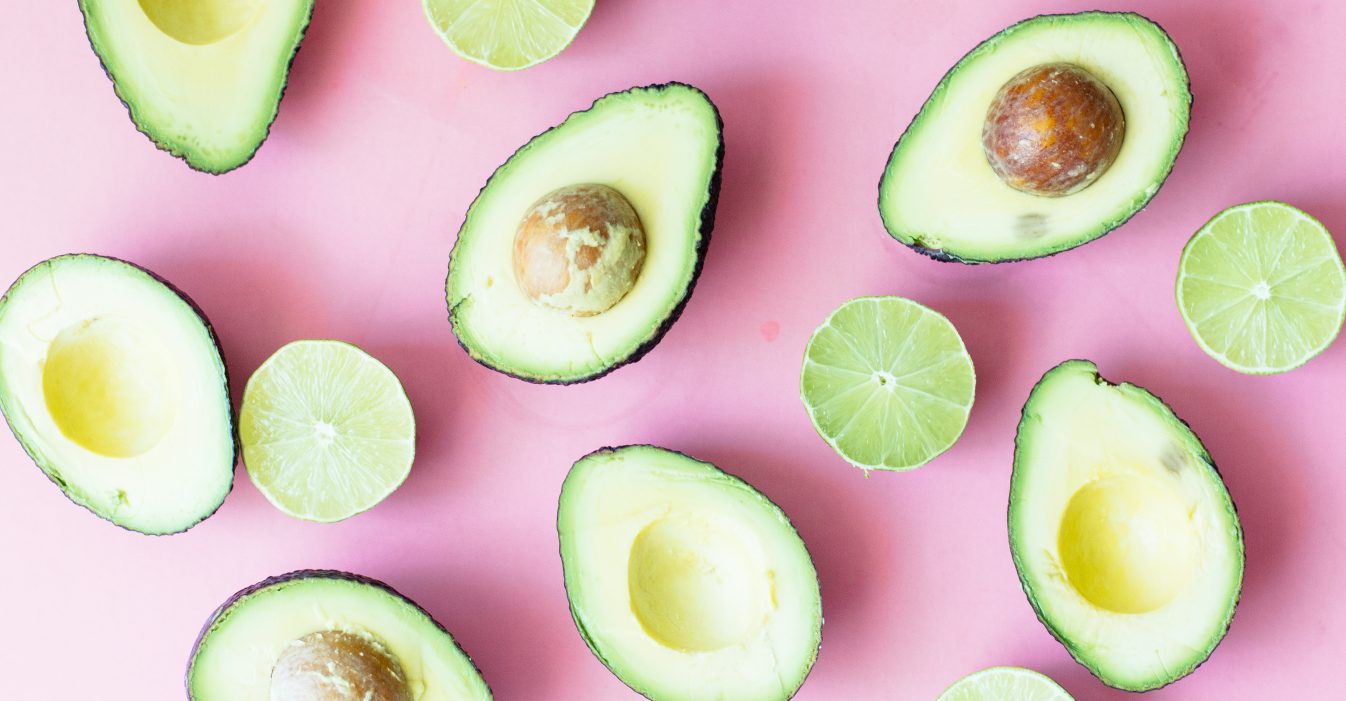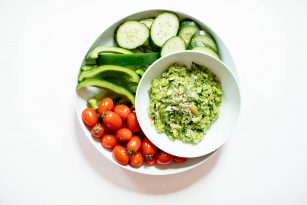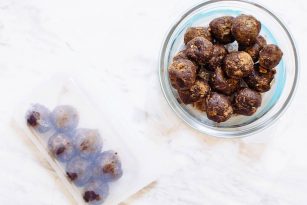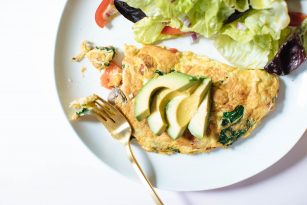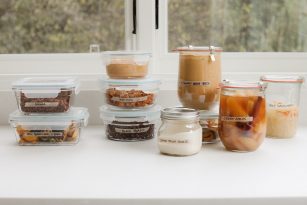What are the best foods and lifestyle choices you can make for fertility if you’re trying to get pregnant now, or in the future?
In honor of National Women’s Health Week and recently Mother’s Day, I’m discussing one of the biggest health concerns for young women: fertility. Whether you’re trying to get pregnant now or in a few years, a healthy pregnancy starts before you even conceive.
I have so many amazing family members and close friends becoming a parent for the first time and it’s been such a beautiful experience for me 1) becoming an aunt or part of this babies life and 2) helping guide those family members and friends with the nutrition they need to think about before getting pregnant, during, and after. Also, it’s good practice for our future, too!
Personal inspiration aside, we’ve been getting a lot of emails from the NS community to cover more topics on the science behind nutrition and the art of living well with pregnancy — we hear you and we’re here for you! If you have more questions, please comment below so we can gather up more article ideas for healthy pregnancies for you. Before we dive into the best foods to eat for fertility and healthy pregnancy, let’s look at some statistics about pregnancy health.
Your Fertility and Preconception Health
Mother’s Day brings up a lot of emotion for many women and men — whether it’s joy for being a parent for the first time or overcoming emotions because you’re not where you want to be with family planning. I can’t speak from personal experience yet, but I’ve successfully coached women with PCOS to change their lifestyle with a major nutrition overhaul in order to help create a path with more potential success when trying to conceive.
If you or someone you know is having a challenging time getting pregnant, you’re truly not alone. According to to the Centers for Disease Control and Prevention (CDC), about 6.1 million American women have trouble getting pregnant or staying pregnant (1). While there are many factors that affect fertility, including hormone imbalances, what you can control is following a healthy lifestyle that promotes fertility and reproductive health while also keeping your mind, body, and spirit healthy. The Office of Women’s Health reports that about one in eight babies is born pre-term — preconception health is said to have a large impact on this (2).
Women are recommended to start preparing for pregnancy three months before conception with lifestyle and nutrition changes. To stay on the safe side, I actually recommend preparing around 6 or more months before. Lifestyle changes such as quitting smoking, maintaining a healthy weight (if you’re underweight, check out this guide), reducing stress, and of course, following a healthy diet are some things you can do to ensure that you’re fertile. The American College of Obstetricians and Gynecologists (ACOG) recommends that women schedule a routine check-up with their doctors before they become pregnant to find out if they have certain risk factors, like being underweight or overweight, that can affect their pregnancy (3).
We know how important nourishing our bodies is with proper nutrition, but it’s even more so with healthy pregnancies. In fact, according to ACOG, the first eight weeks of pregnancy are key for fetal development. Multiple studies have also shown that what a mother eats during pregnancy influences her child’s food choices later in life.
To ensure you’re getting enough nutrients to supply your baby’s growth here’s are the top foods for fertility and pregnancy.
What Are The Best Foods For Fertility?
1. Folate-rich foods
The U.S. Preventative Task Force recommends that all women of childbearing age should consume 400-800 mg of folic acid daily (4). Leafy greens like spinach and kale, beans, citrus fruits, and whole grains are the best food sources of folic acid. Folic acid is important for preventing neural tube defects. The neural tube develops into the brain and spine during the first three to four weeks after conception.
A 2015 study in the European Journal of Clinical Nutrition shows that folic acid can help reduce the risk of preeclampsia, a pregnancy condition characterized by high blood pressure and protein in the urine (5, 6). If untreated, preeclampsia can lead to pregnancy complications and prevent your baby from getting enough blood, oxygen, and food.
2. High-quality protein
Lean protein, such as ground turkey, chicken, eggs, and salmon, are excellent sources of iron — a key nutrient for fertility. To help with the absorption of iron, load up on vitamin C-rich foods, like bell peppers and citrus fruits. Women tend to have lower levels of iron due to blood loss during menstruation. Studies suggest that a diet rich in iron can help prevent anemia during pregnancy.
Anemia is a condition in which there aren’t enough red blood cells in your blood to carry oxygen to different organs and muscles in the body. Pregnant women are at higher risk of developing anemia because of the amount of blood their body needs to support the baby. Low iron levels weaken the immune system and make you more vulnerable to infection and disease. If you’re a vegetarian or want to follow a more plant-centric diet, beans, and other legumes, whole grains, tofu and tempeh and nuts and seeds are all quality plant proteins that provide a wealth of nutrients, including iron.
3. Healthy fats
Studies have shown that omega-3 fatty acids are associated with cognitive function in children. Omega-3 fatty acids are important for your baby’s neurologic development as well as their immune and nervous systems. (7) During pregnancy and breastfeeding, omega-3s are also vital for boosting your mood and preventing postpartum depression in women.
Wild-caught salmon, olive oil, avocados, walnuts, flaxseeds, chia seeds and hemp seeds are packed with omega-3 fatty acids. Ideally, it’s best to get omega-3 fatty acids from fish sources, which contain more bioavailable forms of DHA and EPA (8). Plant-based omega-3 foods like flax, chia, and hemp seeds must be converted into DHA and EPA in the body. Unfortunately, that conversion doesn’t yield as optimal levels of omega-3 compared to food sources like salmon, mackerel, and other fish.
The American Pregnancy Association recommends that pregnant women should consume at least 300 mg of omega-3s daily. Food is always the ideal option, but check with your doctor to see if supplementation might be right for you.
4. Vitamin B6
B-complex vitamins are responsible for promoting healthy skin, hair, and nails. However, they are also important for carrying out a variety of bodily functions as well. Vitamin B6 is a particularly essential nutrient for women who want to become pregnant because it aids in the development of the nervous system and helps prevent preeclampsia and pre-term birth (9). Vitamin B6 can also help alleviate morning sickness symptoms during the early stages of pregnancy, according to the American Pregnancy Association (10). The best foods for vitamin B6 include whole-grain bread and cereals, nuts and seeds, fish, chicken, bananas, avocados, and beans.
5. Complex carbohydrates
Unlike refined carbs, which can elevate blood glucose and create insulin resistance, complex carbs keep you fuller for longer. Fruits, veggies, legumes, and whole grains are examples of complex carbs. During preconception and pregnancy, complex carbs can help prevent insulin resistance that can affect reproductive hormones and your menstrual cycle.
In a 2013 study from the European Journal of Endocrinology, amenorrhea, also known as a missed period, was associated with insulin resistance in women with polycystic ovary syndrome (PCOS) (11). Read more on this topic in our article with seven signs you’re not eating enough food.
6. Antioxidant-rich foods
High levels of oxidative stress in women can lead to fertility issues and pregnancy complications. In fact, oxidative stress has been shown to disrupt follicular fluid, which plays a big role in egg development. Whether you’re hoping for pink or blue, eating a rainbow of antioxidant-rich vegetables and fruits provides protection from cell damage. Those cells include the ones in your reproductive system.
Moreover, a growing body of research also shows that glutathione, the “super antioxidant,” may be used to help treat infertility in women (12). Spinach, broccoli, and avocado are foods rich in glutathione. Women with endometriosis and PCOS might also have lower antioxidant levels, which may contribute to infertility as well (13). Therefore, increasing your antioxidant intake could be a useful strategy to help improve your reproductive outcomes.
How Do You Apply This In Real Life?
If you’re looking for more support and ways to integrate more fertility-boosting foods into your life, then check out our Wellness Coaching. We offer appointments virtually and all of our NS Wellness Coaches are professionally trained to give you expert guidance and practical plans for long-term health! Click here to take the client quiz.

